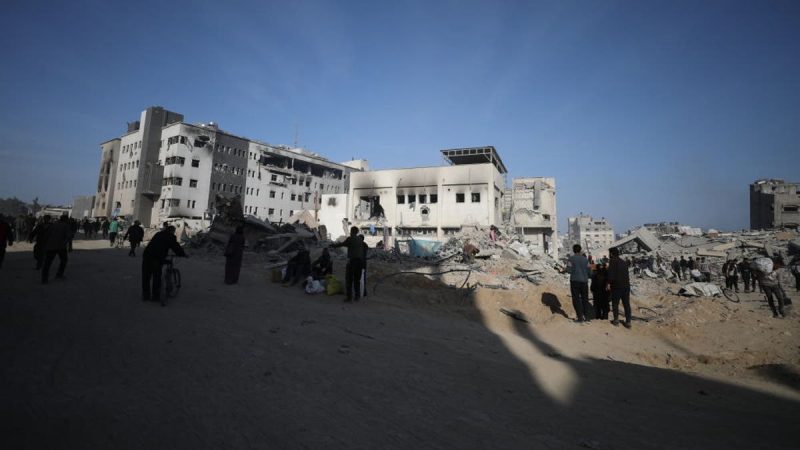After nearly eight months of war, Gaza’s health system is in tatters, with the World Health Organization (WHO) reporting on May 3 that nearly 70% of its hospitals are no longer functioning, while the United Nations and the International Rescue Committee saying even only 15 hospitals, out of some 36, are only partially operating, and 65% of the primary health care centers are out of action completely.
Yet, despite the widespread destruction and chaos, Hamas-employed health and information officials continue to provide daily updates on the rising death toll and countless injuries. Additionally, aid agencies, media outlets and many world leaders, including President Biden, readily quote those figures without question.
Last week, a heated debate erupted after the U.N. officially admitted that the data coming out of Gaza, from both the Hamas-run Ministry of Health and the Government Media Office, could not be verified. While it said the overall death count was likely the same, the international agency reduced by nearly half the number of women and children killed so far in the devastating war.
The move prompted questions, particularly in Israel where Hamas’ data has long been challenged, on the reliability of this sensitive information now coming out of Gaza and why it continues to be cited.
‘It sounds credible when you say the Gaza Ministry of Health reported, but the truth is that most of the ministry employees are Hamas public servants, and they are not even working at the moment, they are on the run,’ Khaled Abu Toameh, a Palestinian affairs analyst based in Jerusalem, told Fox News Digial.
‘No one really knows what is happening there,’ he said, adding, ‘The Hamas government has not been functioning since the second or third week of the war…. They all went underground.’
Since Israeli troops entered Gaza on Oct. 27, three weeks after thousands of terrorists led by Hamas attacked southern Israel, most of those affiliated with the Iranian-backed, U.S.-designated terrorist organization have since taken up arms, fighting from within civilian population centers both above ground and below ground, where the group spent some two decades and billions of dollars constructing an estimated 300 miles of subterranean passageways.
At the start of the war, medical officials employed by Hamas monitored the quickly mounting death toll via a network of computers connecting morgues and hospitals throughout the territory, a system that had previously been validated by human rights groups, the U.N. and the WHO. Previous conflicts had shown the overall death toll count, even though vetted by Hamas, which refuses to distinguish between civilians and combatants, to be fairly accurate.
‘At the start of the war, the health ministry had a stream of casualty data coming in from hospitals across Gaza. That is why so many Western journalists said the ministry’s data was worth citing in their articles and why the U.N. trusted it,’ David Adesnik, a senior fellow and director of research at the Foundation for the Defense of Democracies who has been closely monitoring the situation in Gaza, told Fox News Digital.
‘But, as Israeli troops moved deeper into Gaza, the ministry lost contact with hospitals. To compensate, it began using what it called ‘reliable media sources’ to determine the number of fatalities,’ he said, adding,’It never identified these sources and it’s a stretch to characterize any of the media in Gaza as reliable – instead of a supplement, these media reports began to provide the bulk of the media’s data, accounting for more than 75% of all deaths recorded in the first three months of this year.’
Adesnik said that over the past month, the Gaza Health Ministry began to ‘play down its reliance on media input’ and relabeled the deaths based on media reports as ‘unidentified individuals.’
‘There are still more than 10,000 of these unidentified individuals in the ministry’s official death toll of more than 35,000,’ he said. ‘But the big mystery is whether the ministry has any firm data at all on the 10,000-plus who’re unidentified.’
‘Even if you think the ministry was doing a good job at the beginning of the war collecting casualty data from hospitals, it’s shift to using ‘reliable media sources’ has seriously undermined its credibility,’ Adesnik added.
Also calling into question the reliability of the information coming out of Gaza is the fact that only a handful of Gaza’s 36 hospitals and primary health care facilities that operated pre-Oct.7 are still functioning in some capacity, according to a May 3 report published by the WHO.
Zaher al Wahaidi, who has led Hamas’ Health Information Centre for the past year, told Sky News last month that since February, the morgue monitoring system that was once in place has only been capturing a small fraction of the deaths across the territory.
‘Of the eight major hospitals responsible for collating morgue data, just three are still providing information to the health ministry,’ Sky News reported.
Speaking to Fox News Digital last week, an official from the Coordination of Government Activities in the Territories (COGAT), the Israeli military body that coordinates civilian issues in the Palestinian territories, said that the Hamas-run civilian offices in the Strip were still operating ‘because they are publishing data… mainly in order to put pressure on the international community.’
In addition to the eight hospitals currently operating in Gaza, four in the north of the Strip, two in the center and two in the south, COGAT said there were an additional eight field hospitals, as well as some mobile medical units, being run by multiple countries and international organizations around the Strip. None of those facilities are part of the Hamas-run system.
‘We have seen everything they [Hamas] are reporting from Gaza, and we also see that there is chaos in their reporting,’ the COGAT official said. ‘The numbers they publish are not right or accurate.’
The official pointed to the example of the recent change in death toll figures for women and children, saying, ‘This shows how they are trying to take advantage of the situation and are manipulating the numbers for political reasons.’
Abu Toameh said that the physical building that once housed Hamas’ Ministry of Health might still be standing, but whether the officials that once worked there are showing up for work each morning was another question.
‘Are the hospitals in Khan Younis talking to those in Rafah and those in Rafah talking to those in Jabaliya,’ he said, referring to hospitals in some of the main urban centers in Gaza. ‘Is there anyone really in charge? I don’t know, and I don’t think anyone really knows.’
Abu Toameh also said that many civilians no longer take their dead to hospitals, preferring instead to bury them immediately in accordance with Islamic law.
Despite the breakdown, agencies, such as the U.N. Office for the Coordination of Humanitarian Affairs (OCHA), continue to cite the Hamas-published data as the basis for daily reports on its websites, although it does include a disclaimer in the small print of not being able to independently verify the figures.
‘In the absence of complete U.N. figures on casualties, it is global standard to cite the local health authorities as appropriate,’ a United Nations official in Jerusalem told Fox News Digital when asked why it was still relying on Hamas’ data.
‘When it comes to disaggregated data, once the Ministry of Health in Gaza published breakdowns that were more comprehensive, backed up by a list of names, U.N. reports reflected that, with attribution to the source alongside a clear note stating the U.N.’s inability to presently provide an independent confirmation of the data,’ the official, who spoke anonymously in order to speak more freely about the sensitive topic, said, explaining last week’s change to the women and children fatality figures.
‘The U.N. in Gaza continues working to independently verify fatality figures, where conditions permit,’ the official said.
The WHO and the State Department did not respond to requests for a comment from Fox News Digital about why unverified, and possibly inaccurate, data from Hamas was still being quoted and used to dictate policy on the Israel-Hamas conflict.
When asked last week in a press briefing whether President Biden had confidence in the casualty numbers coming out of Gaza, National Security communications advisor John Kirby said, ‘The President watches this very, very closely. And you’ve heard him talk about the more than 30,000 people that have been killed, and he said the majority are women and children. And he’s also said that’s unacceptable.’
‘As we’ve maintained time and time again, the right number of civilian casualties ought to be zero,’ he added. ‘But in terms of what specific number we’re quoting or citing on any given day, I mean, we’re doing the best we can working with the Israelis to — to ascertain the scope of the civilian suffering, but it’s obviously immense,’ Kirby said.
Last week, Israeli government spokesperson Avi Hyman announced that over 14,000 terrorists have been killed in Gaza and 16,000 civilians.
In a different press briefing last week, Vedant Patel, principal deputy spokesperson at the State Department, responded to a question about the ‘exaggerated Gaza death statistics provided by Hamas.’
‘Let me just be pretty clear about this – this has come up a couple times today – that the facts on the ground are pretty clear,’ he said. ‘Tens of thousands of innocent civilians have lost their lives, and any number above zero is tragic, problematic, heartbreaking, and indicative of the fact that more needs to be done to protect civilians in Gaza.’
‘It is also true that we are dealing with a belligerent, Hamas, that has a track record of co-locating itself and embedding itself within civilian infrastructure,’ Patel said.
He did not comment on whether the State Department or the White House would continue referring to Hamas’ data.
A White House spokesman referred Fox News Digital to the National Security Council, who did not respond by press time.


